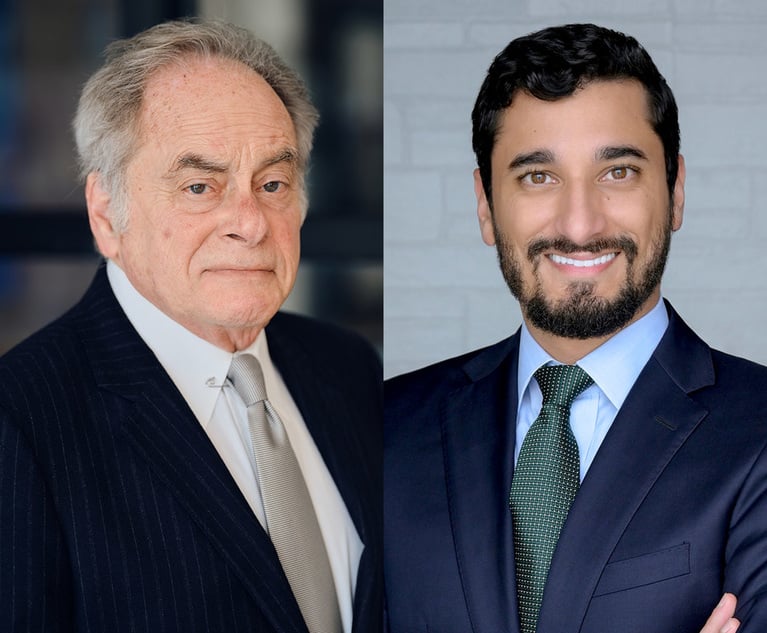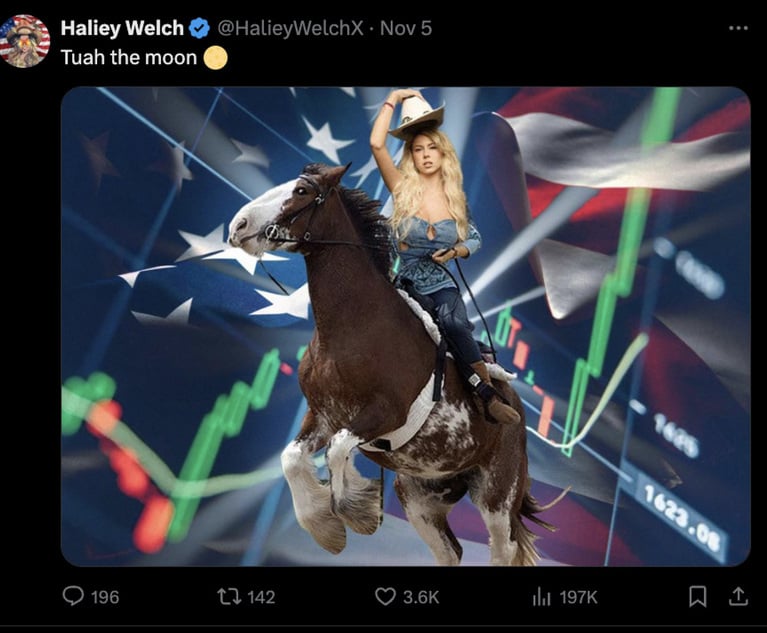 Entrance Sign at the University of Florida, in Gainesville, Florida.
Entrance Sign at the University of Florida, in Gainesville, Florida. UF Professors Say High-Profile Lawsuit Now 'Moot'
"The University of Florida's position is, and always has been, that the court does not have jurisdiction over this lawsuit because the plaintiffs do not have standing, the case was moot before it was filed and there are no claims that are ripe for adjudication," the University of Florida has said.
January 03, 2023 at 09:55 AM
5 minute read
 Entrance Sign at the University of Florida, in Gainesville, Florida.
Entrance Sign at the University of Florida, in Gainesville, Florida.
Saying the case is "moot," University of Florida professors are asking a federal judge to dismiss a lawsuit that challenged a controversial conflict-of-interest policy that gave school administrators discretion over allowing faculty members to serve as expert witnesses in litigation.
The university adopted a revised policy in October that resolved the professors' concerns, according to a motion filed Wednesday by the plaintiffs.
Tenured political-science professors Sharon Austin, Michael McDonald and Daniel Smith filed the lawsuit last year after university officials denied their requests to serve as witnesses for groups fighting a 2021 state elections law in court. In denying the professors' requests, university officials said going against the executive branch of the state government was "adverse" to the school's interests.
In a scathing 74-page ruling in January, Chief U.S. District Judge Mark Walker blocked UF officials from enforcing the policy about professors testifying. Walker's ruling called the policy "pernicious" and a violation of faculty members' First Amendment rights. The university filed an appeal that remains pending.
The professors, who were joined by three other faculty members in the lawsuit, argued that the challenged conflict-of-interest policy unconstitutionally discriminated based on viewpoints and content and had a "chilling" effect.
Amid a national spotlight on the policy, University of Florida President Kent Fuchs ultimately allowed the professors to be paid as expert witnesses in the elections lawsuit and hastily assembled a task force to explore the conflict-of-interest issue and offer recommendations. Fuchs signed off on a revised policy stating there is a "strong presumption" that the university will approve faculty or staff requests to testify as expert witnesses.
The university on Oct. 13 adopted another revision to the policy, which now says "viewpoint and content of the employee's speech or other activity shall not be considered when assessing whether a conflict of interest exists."
The October version of the policy rectified the professors' concerns that led to the lawsuit, according to Wednesday's motion.
"Throughout this litigation, plaintiffs repeatedly emphasized that the relief they sought was a clear and unambiguous commitment by defendants that content and viewpoint could play no role in determining whether a conflict of interest or conflict of commitment existed. Defendants have finally now taken that basic and essential step," the motion said.
The motion to dismiss the case was filed "without prejudice," a legal distinction that would leave open the door to pursuing a lawsuit in the future.
This content has been archived. It is available through our partners, LexisNexis® and Bloomberg Law.
To view this content, please continue to their sites.
Not a Lexis Subscriber?
Subscribe Now
Not a Bloomberg Law Subscriber?
Subscribe Now
NOT FOR REPRINT
© 2024 ALM Global, LLC, All Rights Reserved. Request academic re-use from www.copyright.com. All other uses, submit a request to [email protected]. For more information visit Asset & Logo Licensing.
You Might Like
View All
Miami Beach Hotel Sues Celebrity Rabbi Shmuley Boteach, Asserts It Won’t Be ‘Extorted'
4 minute read
‘Hawk Tuah Girl’ $440 Million Meme Coin Collapse Sparks Legal Battle
4 minute read
Trending Stories
- 1Call for Nominations: Elite Trial Lawyers 2025
- 2Senate Judiciary Dems Release Report on Supreme Court Ethics
- 3Senate Confirms Last 2 of Biden's California Judicial Nominees
- 4Morrison & Foerster Doles Out Year-End and Special Bonuses, Raises Base Compensation for Associates
- 5Tom Girardi to Surrender to Federal Authorities on Jan. 7
Who Got The Work
Michael G. Bongiorno, Andrew Scott Dulberg and Elizabeth E. Driscoll from Wilmer Cutler Pickering Hale and Dorr have stepped in to represent Symbotic Inc., an A.I.-enabled technology platform that focuses on increasing supply chain efficiency, and other defendants in a pending shareholder derivative lawsuit. The case, filed Oct. 2 in Massachusetts District Court by the Brown Law Firm on behalf of Stephen Austen, accuses certain officers and directors of misleading investors in regard to Symbotic's potential for margin growth by failing to disclose that the company was not equipped to timely deploy its systems or manage expenses through project delays. The case, assigned to U.S. District Judge Nathaniel M. Gorton, is 1:24-cv-12522, Austen v. Cohen et al.
Who Got The Work
Edmund Polubinski and Marie Killmond of Davis Polk & Wardwell have entered appearances for data platform software development company MongoDB and other defendants in a pending shareholder derivative lawsuit. The action, filed Oct. 7 in New York Southern District Court by the Brown Law Firm, accuses the company's directors and/or officers of falsely expressing confidence in the company’s restructuring of its sales incentive plan and downplaying the severity of decreases in its upfront commitments. The case is 1:24-cv-07594, Roy v. Ittycheria et al.
Who Got The Work
Amy O. Bruchs and Kurt F. Ellison of Michael Best & Friedrich have entered appearances for Epic Systems Corp. in a pending employment discrimination lawsuit. The suit was filed Sept. 7 in Wisconsin Western District Court by Levine Eisberner LLC and Siri & Glimstad on behalf of a project manager who claims that he was wrongfully terminated after applying for a religious exemption to the defendant's COVID-19 vaccine mandate. The case, assigned to U.S. Magistrate Judge Anita Marie Boor, is 3:24-cv-00630, Secker, Nathan v. Epic Systems Corporation.
Who Got The Work
David X. Sullivan, Thomas J. Finn and Gregory A. Hall from McCarter & English have entered appearances for Sunrun Installation Services in a pending civil rights lawsuit. The complaint was filed Sept. 4 in Connecticut District Court by attorney Robert M. Berke on behalf of former employee George Edward Steins, who was arrested and charged with employing an unregistered home improvement salesperson. The complaint alleges that had Sunrun informed the Connecticut Department of Consumer Protection that the plaintiff's employment had ended in 2017 and that he no longer held Sunrun's home improvement contractor license, he would not have been hit with charges, which were dismissed in May 2024. The case, assigned to U.S. District Judge Jeffrey A. Meyer, is 3:24-cv-01423, Steins v. Sunrun, Inc. et al.
Who Got The Work
Greenberg Traurig shareholder Joshua L. Raskin has entered an appearance for boohoo.com UK Ltd. in a pending patent infringement lawsuit. The suit, filed Sept. 3 in Texas Eastern District Court by Rozier Hardt McDonough on behalf of Alto Dynamics, asserts five patents related to an online shopping platform. The case, assigned to U.S. District Judge Rodney Gilstrap, is 2:24-cv-00719, Alto Dynamics, LLC v. boohoo.com UK Limited.
Featured Firms
Law Offices of Gary Martin Hays & Associates, P.C.
(470) 294-1674
Law Offices of Mark E. Salomone
(857) 444-6468
Smith & Hassler
(713) 739-1250







